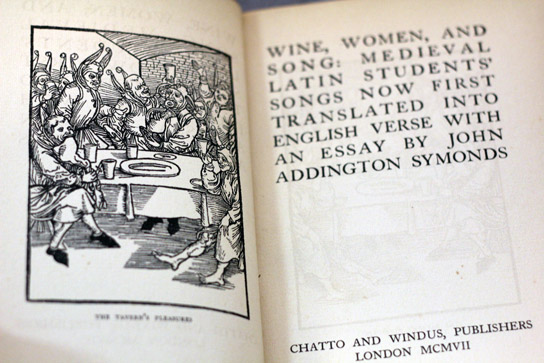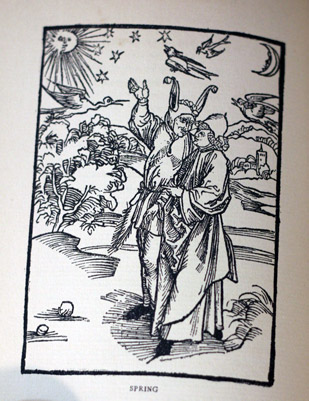All text is in English, translated from Latin.
Largely composed of translations from Carmina Burana.
About the Carmina Burana (from Wikipedia):
Carmina Burana is the name given to a manuscript of 254 poems and dramatic texts mostly from the 11th or 12th century, although some are from the 13th century. The pieces are mostly bawdy, irreverent, and satirical. They were written principally in Medieval Latin; a few in Middle High German, and some with traces of Old French or Provençal. Some are macaronic, a mixture of Latin and German or French vernacular.
They were written by students and clergy when the Latin idiom was the lingua franca across Italy and western Europe for travelling scholars, universities and theologians. Most of the poems and songs appear to be the work of Goliards, clergy (mostly students) who set up and satirized the Catholic Church. The collection preserves the works of a number of poets, including Peter of Blois, Walter of Châtillon, and an anonymous poet, referred to as the Archpoet.
The collection was found in 1803 in the Benedictine monastery of Benediktbeuern, Bavaria, and is now housed in the Bavarian State Library in Munich. Along with the Carmina Cantabrigiensia, the Carmina Burana is the most important collection of Goliard and vagabond songs.
The manuscripts reflect an “international” European movement, with songs originating from Occitania, France, England, Scotland, Aragon, Castile and the Holy Roman Empire.
Twenty-four poems in Carmina Burana were set to music by Carl Orff in 1936. Orff’s composition quickly became popular and a staple piece of the classical music repertoire. The opening and closing movement, “O Fortuna”, has been used in numerous films.
Excerpt 1:
Winter, now thy spite is spent,
Frost and ice and branches bent!
Fogs and furious storms are o’er,
Sloth and torpor, sorrow frore,
Pallid wrath, lean discontent.
Comes the graceful band of May!
Cloudless shines the limpid day,
Shine by night the Pleiades;
While a grateful summer breeze
Makes the season soft and gay.
Golden Love! shine forth to view!
Souls of stubborn men subdue!
See me bend! what is thy mind?
Make the girl thou givest kind,
And a leaping ram’s thy due!
O the jocund face of earth,
Breathing with young grassy birth!
Every tree with foliage clad,
Singing birds in greenwood glad,
Flowering fields for lovers’ mirth!
Excerpt 2:
Some are gaming, some are drinking,
Some are living without thinking;
And of those who make the racket,
Some are stripped of coat and jacket;
Some get clothes of finer feather,
Some are cleaned out altogether;
No one there dreads death’s invasion,
But all drink in emulation.






